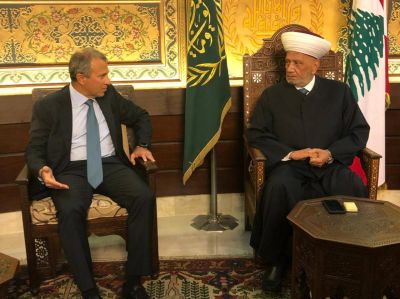
FPM leader Gebran Bassil received by the Mufti of the Republic Abdellatif Deriane in Dar el-Fatwa. (Credit: DR)
In a Sept. 25 speech during the inauguration of a Free Patriotic Movement office in Zgharta, party leader Gebran Bassil reminded the audience that Lebanon's power comes from “the strength of its army, its people and its president.”
Bassil's statements recalled Hezbollah's and the March 8 camp's famous motto: “The people, the army, and the resistance.”
But what about “the resistance”?
Do these remarks signal a disagreement between the two political parties, allied since 2006, as Lebanon's presidential election fast approaches?
In any case, the message seemed to be delivered. It did not take long for Hezbollah's electronic army to fire back at the FMP strongman.
“At every opportunity, Gebran Bassil reminds us of his desire to see a peace [deal] signed between Lebanon and Israel,” said one Twitter user, accusing the FMP leader of being on the payroll of foreign powers.
Photos of Hezbollah leader Hassan Nasrallah also made the rounds on social media with the caption “our strength.”
Centrist image
The atmosphere seems tense between Hezbollah and the FPM. Why?
President Michel Aoun's term in office expires in just one month — on Oct. 31 — and the timeline to elect a president began Sept. 1.
Meanwhile, Bassil, who repeatedly denied his candidacy but is nevertheless acting like a potential presidential candidate, does not seem able to count on the support of any party but his own.
His only ally, Hezbollah, which succeeded in imposing Aoun — Bassil's father-in-law — as president in 2016, seems for the moment reluctant to wage the same battle for him.
Nasrallah even said he is open to a “consensus president,” as do the majority of political parties.
But the fact remains that, in Hezbollah's calculations, the FPM leader is a strategic ally who offers valuable Christian cover, as did his father-in-law during his six-year term.
Bassil is well aware of the circumstances and seems to want to take advantage by pressing Hezbollah in the hope that the party will eventually endorse his candidacy, against all odds.
“Hezbollah does not intend to fight for anyone and has already said that it has no candidate for presidency,” Faisal Abdel Sater, an observer close to the party, told L'Orient-Le Jour.
“There is therefore a clear divergence between the party and the FPM on this issue. This is not to mention Bassil's irritation with Hezbollah's close relations with [Parliament Speaker] Nabih Berri, a fierce opponent of the Aounist camp,” he added.
For Abdel Sater, however, these differences should not compromise relations between the two parties. “It is only a disagreement. The ties between the FPM and Hezbollah remain very strong.”
Why then has Bassil chosen to distance himself from Hezbollah in his remarks? To some analysts, the FPM leader may be trying to disguise himself as a consensus figure.
“Of course, every presidential candidate tries to present themselves in a new, more consociational light before the election,” Kassem Kassir, an analyst close to Hezbollah, told L’Orient-Le Jour.
The Aounist camp, however, denies any claims that Bassil wishes to present a more centrist image of himself.
“While being open to dialogue with everyone, Bassil is committed to the resistance and relations with Hezbollah,” Rindala Jabbour, an FPM official, told L'Orient-Le Jour.
“In his speech, [Bassil] was just referring to the slogan upheld by Gen. Michel Aoun when he headed the military transitional government in 1989: 'The president, the army, the people,'” she explained.
Winking at the Mufti
In addition to messages he tried to convey to Hezbollah, Bassil has made overtures to Dar al-Fatwa — the highest Sunni authority in the country — after having been sidelined in the wake of the rupture between the FPM and former Prime Minister Saad Hariri.
“We are committed to the Taif Agreement,” Bassil said after a meeting with Grand Mufti Abdel-Latif Derian, praising the meeting of Sunni MPs that took place last Saturday at Aisha Bakkar.
The meeting, however, was perceived by many analysts as a reaction to the repeated attacks of the Aounist camp on the 1989 Taif Agreement, which ended Lebanon's 1975-90 Civil War. The deal, sponsored by Saudi Arabia, transferred some of the preeminent prerogatives formerly held by Christians, ie, the president, to the government headed by a Sunni prime minister. It was slammed by Aoun at the time.
Aoun and his associates have been incessantly stressing that, that in the event of a presidential vacancy, the caretaker government led by Prime Minister Najib Mikati cannot assume the prerogatives of the president — a claim that aroused the ire of Sunni figures who view this as in direct conflict with the Taif Agreement.
The 1989 deal has been fiercely defended by foreign powers in recent days.
On the sidelines of the United Nations General Assembly in New York last week, a joint France, US, Saudi communicate called on Lebanon to comply with the Taif Agreement — a favorite subject of Saudi Ambassador to Lebanon Walid Bukhari.
During his meetings with Lebanese opposition figures and via his Twitter account, Bukhari has repeatedly warned against changing the current political system, as advocated by the Aounist camp.
By emphasizing his commitment to Taif, Bassil appears to be sending positive messages to the Sunni community in Lebanon, but especially to Saudi Arabia.
“It's in the country's interest to live in peace within its Arab environment,” Bassil said Tuesday from Dar al-Fatwa.
“Some people wrongly think that the FPM is the enemy of the Sunni community. This is not true at all, and Gebran Bassil's visit to the Mufti aims to prove this,” Jabbour said
“What's more, he is not even a candidate,” she added.
For the moment.
This article was originally published in French in L'Orient-Le Jour. Translation by Sahar Ghoussoub.
